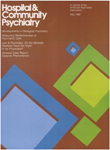A Conceptual Model for Determining the Least Restrictive Treatment-Training Modality
Abstract
Much attention has been paid in recent years to the concept of the least restrictive treatment or training for developmentally disabled individuals. However, few well-defined procedures exist for determining the restrictiveness of modalities commonly used with these individuals. The authors identified ten frequently used modalities and six criteria for determining their relative restrictiveness. A total of 97 mental health professionals rated each modality according to the criteria, and a generalized rank order of the ten was obtained. Criteria were then established for applying the more restrictive modalities to individual residents' cases. The authors propose a four-part review process to ensure that the individual needs and rights of residents are respected.
Access content
To read the fulltext, please use one of the options below to sign in or purchase access.- Personal login
- Institutional Login
- Sign in via OpenAthens
- Register for access
-
Please login/register if you wish to pair your device and check access availability.
Not a subscriber?
PsychiatryOnline subscription options offer access to the DSM-5 library, books, journals, CME, and patient resources. This all-in-one virtual library provides psychiatrists and mental health professionals with key resources for diagnosis, treatment, research, and professional development.
Need more help? PsychiatryOnline Customer Service may be reached by emailing [email protected] or by calling 800-368-5777 (in the U.S.) or 703-907-7322 (outside the U.S.).



